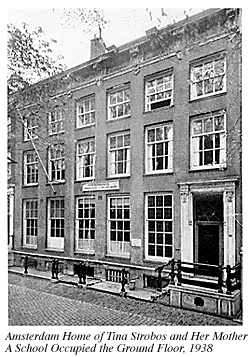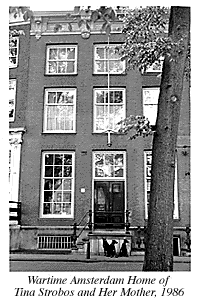TINA STROBOS TELLS HER STORY (Continued)

ARREST: The risks undertaken by Tina and her mother in helping other people were considerable. Between 1942, and the end of 1944, their home was "visited" eight times by the Gestapo, Tina was arrested three times, her mother twice. Their maid was arrested once for black marketeering.
TINA STROBOS: One day a man came and announced he was a carpenter, sent by the underground to make a hiding place for us. My mother looked at me, "Do you know this man?" I said, "No, of course not, but if we can't trust him, who can we trust?" So she agreed: "Okay, show him the attic." That's how I found out I was part of a network. They didn't give you an official certificate. This carpenter built sort of an attic within our attic, almost inaccessible. In one or two of the raids
the Gestapo went up there and knocked around, but they never discovered it.
My mother and I were cautious. We didn't want to jeopardize ourselves or anyone else. Our house was well known, so in a way it was not such a great place to hide, but nobody was ever found in our house. Nobody was ever caught.
We did have a spy in the Gestapo headquarters, who would warn us with a phone call saying, "I've heard you're going to have visitors within the next few days." Then I would call on all my resources to let them know that we had to empty out our house and find places for the people who were staying with us. Then we would check all the hiding places to make sure there was nothing they could get us for. Once our house was clean we would just sit and wait for them.
Hans De Jong was an industrialist who hid in our house for a whole year, during '43 and '44. The Nazis were eager to get people like him because of their money.
 One day we heard that his bookkeeper, who was in the habit of occasionally coming by to bring him money, was under arrest. We didn't trust this man not to betray us, so we very quickly found De Jong another hiding place. We just assumed that the bookkeeper would have mentioned our address to the Gestapo.
One day we heard that his bookkeeper, who was in the habit of occasionally coming by to bring him money, was under arrest. We didn't trust this man not to betray us, so we very quickly found De Jong another hiding place. We just assumed that the bookkeeper would have mentioned our address to the Gestapo.
I thought it might be a good idea for my mother to go out of town on a little vacation. So she went to visit her two very dear friends in Leiden while I stayed at home. We figured it might be valuable for Hans De Jong to know what his bookkeeper blabbed to the Gestapo, so I had the task, if they came, to ask about him, to find out what they knew. Sure enough, they came.
You always knew when it was the Gestapo coming to visit. They rang the bell hard and banged on the door. All at once, they opened the door wide and jumped in, two men in mufti, civilian clothes, with hidden guns. They wouldn't say their business until they had closed the door behind them. I acted very naive. I told them my mother rented rooms and I was taking care of her business while she was away on vacation.
Suddenly, there were six men in the house. Two of them, one on each side, took me by the wrists and threw me against the wall.
"You're under arrest!"
"I don't speak German, I can't understand you."
So they yelled again, "We need a translator!"
I speak perfect German, but I had been trained that if arrested, to ask for an interpreter. To hear the question in German, then the translation, gives you more time to think of a good answer. It worked pretty well. So I said to them, "Hans De Jong?
Sure I know him. He rented rooms from us. Did he do anything wrong?"
The Gestapo said, "He's a Jew," as if I should know that that was a terrible thing.
"But he has blue eyes and blond hair. How could he be a Jew?"
Then he went on, "Some Jews are like violets in the woods. They hide by having blue eyes and blond hair," as if they were doing this on purpose.
"Really? I can't believe it."
"I will show you pictures."
And he did. He showed me pictures of eye corners. That's right. There were about sixteen pictures of the corners of eyes. "That's what we're looking for in the streets," he said. They did, too. They arrested Jews and half-Jews in the street, even though they didn't look Jewish. A half-Jew they could recognize. To me these people didn't look Jewish at all.
I was sitting during this interrogation, nervously crossing and uncrossing my legs. It was summer and I was wearing shorts. At one point he said, "You don't have to show off your legs to me. That doesn't impress me at all." Well, that remark reminded me that he was just a man. I had nice legs, fortunately, and he was noticing. Realizing that, it relaxed me no end--I can't tell you how much. Suddenly I was no longer this beaten-down person under arrest, threatened with punishment. Because they were very threatening. Now I became a young girl, not too bad looking, who apparently was seductive to them . I felt so much more at ease that I even became fresh; I noticed this was a good tactic. I took the attitude that I had no idea what they were talking about, I hadn't done anything wrong, and what was all the fuss about anyway? They saw I wasn't scared anymore, and somehow it turned into a more human intercourse with someone who was being nasty, giving me the right to be nasty back.
I was too tactful to get them angry. But I recovered a lot of confidence and I stopped trembling. Finally he said, "You and your mother had better come to Gestapo Headquarters in The Hague. We're going to pursue this further. We want to find this man and we think you know how."
Later, when we went to The Hague, we dressed to the nines, and we were both speaking fluent German, to flatter them. These were different people now, highly placed Gestapo officers, who were polite and doctrinaire. They weren't at all suspicious that I had learned German so well in just a few weeks. They weren't that smart, really. They were only interested in finding out where this Hans De Jong was. We were supposed to let them know immediately if we saw him or got a message from him. While we were there,we heard our interrogator say to an underling, "Go to the Haverstrat." We knew that was De Jong's other hiding address, where he had been before, and where indeed he might have been now, except that luckily we didn't send him there this time. So as soon as we returned to Amsterdam I got a message to the Haverstrat to warn them. The people there didn't take anyone in for a long while after that. And we didn't either. This was in 1943. De Jong got caught in '44. He was in jail and was shot in 1945.
 One day we heard that his bookkeeper, who was in the habit of occasionally coming by to bring him money, was under arrest. We didn't trust this man not to betray us, so we very quickly found De Jong another hiding place. We just assumed that the bookkeeper would have mentioned our address to the Gestapo.
One day we heard that his bookkeeper, who was in the habit of occasionally coming by to bring him money, was under arrest. We didn't trust this man not to betray us, so we very quickly found De Jong another hiding place. We just assumed that the bookkeeper would have mentioned our address to the Gestapo.
